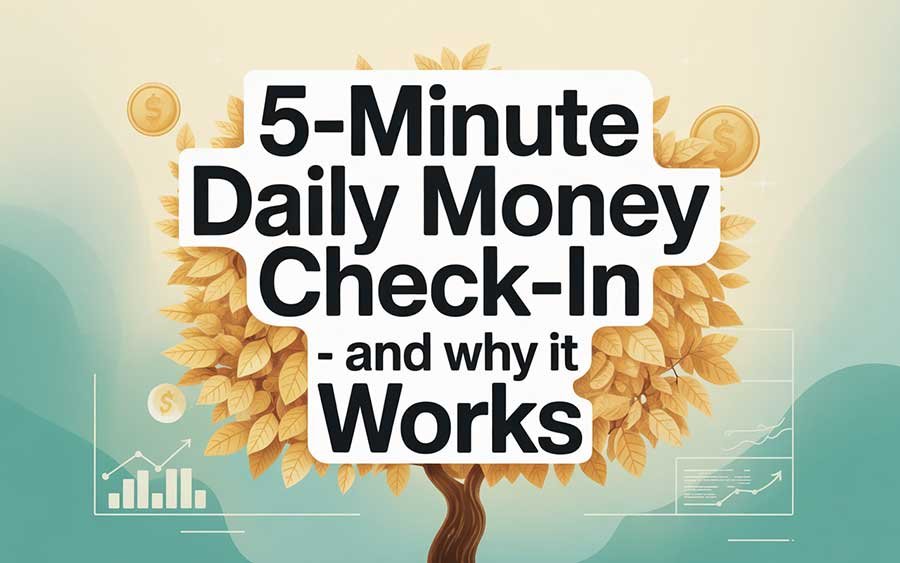
5-Minute Daily Money Check-In – And Why It Works: Your Key to Financial Control
For many, managing money feels like a monumental task, reserved for an annual tax season scramble or a panicked glance at the bank balance when bills are due. This infrequent engagement often leads to financial anxiety, overspending, missed opportunities, and a constant feeling of being reactive rather than proactive with your money. The idea of “budgeting” itself can conjure images of complex spreadsheets and hours of number-crunching, deterring even the most well-intentioned individuals.

But what if mastering your money didn’t require a marathon session, but rather a simple, consistent habit that takes less time than brewing your morning coffee? Enter the 5-minute daily money check-in. This seemingly small habit is a powerful game-changer, transforming your relationship with money from one of dread and avoidance to one of awareness and empowerment. It’s not about meticulous budgeting every day, but about consistent, bite-sized engagement that keeps you connected to your financial reality. This mindful approach can significantly contribute to building long-term financial stability, similar to the principles behind 10 effective strategies for building wealth in your 20s.
This article will break down what a 5-minute daily money check-in entails, reveal the psychological and practical reasons why it’s so effective, and show you how to seamlessly integrate it into your routine for greater financial control and peace of mind.
The Illusion of Ignorance is Bliss: Why Avoidance Fails
Many people avoid looking at their money because it feels overwhelming or brings up anxiety. They prefer to operate on a “hope and pray” system, only checking balances when absolutely necessary. This avoidance, however, creates a vicious cycle:
- Surprise Expenses: Unforeseen bills or charges hit harder because you weren’t prepared.
- Overspending: Without regular monitoring, it’s easy for small, discretionary purchases to add up unnoticed.
- Missed Opportunities: You might miss out on savings opportunities, investment chances, or hitting financial goals.
- Increased Stress: The underlying uncertainty about your financial situation creates chronic stress.
- Lack of Control: You feel like money is happening to you, rather than you managing it.
A daily money check-in dispels this illusion, replacing uncertainty with clarity, and anxiety with control.
What a 5-Minute Daily Money Check-In Looks Like
This isn’t about deep analysis; it’s about a quick, intentional pulse check. Choose a consistent time each day – perhaps with your first cup of coffee, during a commute, or before bed.
Here’s what you might do in those 5 minutes:
1. Review Your Main Accounts (2 minutes)
- The Check-In: Quickly open your banking app or website. Glance at your checking account balance, savings account balance, and credit card balances.
- Why it works: It provides an immediate snapshot of your financial landscape. You catch unusual activity (fraud), see where you stand for the day, and internalize your balances.
- Real-Life Example: I used to only check my bank account when I was about to pay bills, often leading to a knot in my stomach if the balance was lower than expected. By quickly checking it every morning, I gained a realistic sense of my available funds, allowing me to adjust my spending for the day proactively. If a surprise charge popped up, I’d notice it immediately, rather than weeks later.
2. Scan Recent Transactions (1 minute)
- The Check-In: Look at the last few transactions on your checking and credit card accounts.
- Why it works: You identify where your money is going, confirm legitimate purchases, and catch any sneaky subscriptions or unauthorized charges early.
- Real-Life Example: Sarah started noticing small, recurring charges she didn’t recognize when she scanned her transactions. Turns out, she had forgotten about two free trial subscriptions that had converted to paid memberships. Catching these within a day meant she could cancel them quickly, saving her $30/month she would have otherwise lost. This is a subtle yet powerful strategy that complements 7 ways to cut costs without feeling deprived.
3. Note Today’s Spending Plan/Intentions (1 minute)
- The Check-In: Briefly think about any planned spending for the day. Are you going out for lunch? Buying groceries? Will you be disciplined about it? If you have a budget, how does today’s spending fit into it?
- Why it works: It makes spending conscious rather than impulsive. You decide before you spend, rather than reacting to temptations.
- Real-Life Example: Mark used to spend impulsively on lunch every day, often exceeding his budget. His daily check-in became a moment to ask, “Do I have lunch money today, or should I pack something?” This simple intention setting drastically reduced his spontaneous spending and helped him stay within his meal budget.
4. Acknowledge a Goal (1 minute)
- The Check-In: Take a moment to acknowledge one of your financial goals (e.g., “I’m saving for a down payment,” “I’m working towards paying off my credit card,” “I’m building generational wealth”). This helps you stay aligned with your long-term vision.
- Why it works: It provides motivation and reinforces your “why” behind financial discipline. It connects your daily actions to your bigger picture. This positive reinforcement supports building significant financial structures, such as those covered in 11 simple rules to build generational wealth.
- Real-Life Example: Emily was saving for a large vacation. Every morning during her 5-minute check-in, she’d quickly glance at her vacation savings balance. This visual progress, even small increments, kept her motivated to stick to her budget and make conscious spending choices throughout the day.
Why the 5-Minute Daily Money Check-In Works So Well
Its effectiveness lies in its simplicity and psychological benefits:
- Breaks Down Overwhelm: Five minutes is non-intimidating. It makes money management feel achievable, not daunting.
- Builds Consistency: Short, daily habits are easier to stick with than infrequent, lengthy sessions.
- Fosters Awareness, Not Judgment: It’s a quick observation, not an intense audit. You’re simply noting, not necessarily fixing everything in that moment. This helps in avoiding common pitfalls like 10 steps to avoid lifestyle inflation.
- Creates a Feedback Loop: You immediately see the impact of your spending decisions, which reinforces positive habits and discourages negative ones.
- Reduces “Money Amnesia”: We often forget small purchases. A daily check-in keeps your spending top-of-mind.
- Increases Financial Confidence: Regular engagement builds comfort and competence with your money, making you feel more in control. Even if you consider working with a professional, a daily check-in makes you better prepared to leverage the 9 key benefits of having a financial advisor.
- Early Problem Detection: You spot fraudulent charges, unexpected fees, or budget overruns much faster, allowing for quicker correction. This is particularly relevant when considering 18 things to consider before making a major investment, as daily awareness prevents hasty decisions.
Making It Stick: Tips for Your Daily Money Check-In
- Choose Your Time Wisely: Pick a time when you’re less likely to be interrupted and when your mind is relatively fresh.
- Automate Access: Save your banking/budgeting app as a favorite or on your home screen for quick access.
- Combine with an Existing Habit: “Stack” this new habit on top of an old one (e.g., “After I finish my morning stretch, I will do my 5-minute money check-in”).
- Start Simple: Don’t try to track every single penny perfectly from day one. Just consistently review your balances and recent transactions.
- Be Kind to Yourself: If you miss a day, don’t beat yourself up. Just pick it up again tomorrow. The goal is consistency over perfection.
A 5-minute daily money check-in is not a magical solution to all financial woes, but it is an incredibly effective habit for fostering awareness, reducing stress, and putting you firmly in the driver’s seat of your financial life. Give it a try – you might be surprised by the profound impact such a small daily investment can have.
20 Empowering Quotes on Financial Habits and Discipline:
- “A budget is telling your money where to go instead of wondering where it went.” – Dave Ramsey
- “The habit of saving is itself an education; it fosters every virtue, teaches self-denial, cultivates foresight, and so sharpens the wits.” – T.T. Munger
- “It’s not how much money you make, but how much money you keep.” – Robert Kiyosaki
- “You must gain control over your money or the lack of it will forever control you.” – Dave Ramsey
- “Every single dollar you spend is a vote for the kind of world you want to live in.” – Anna Lappe (Or the financial future you want).
- “Money is a terrible master but an excellent servant.” – P.T. Barnum
- “Financial peace isn’t the acquisition of stuff. It’s learning to live on less than you make, so you can save money and invest money.” – Dave Ramsey
- “Small daily improvements are the key to long-term results.” – Anonymous
- “The journey of a thousand miles begins with a single step.” – Lao Tzu (A 5-minute check-in is that step).
- “An investment in knowledge pays the best interest.” – Benjamin Franklin (Financial knowledge from checking in).
- “Do not save what is left after spending, but spend what is left after saving.” – Warren Buffett
- “The best way to predict the future is to create it.” – Peter Drucker
- “If you don’t manage your money, your money will manage you.” – Unknown
- “Compound interest is the eighth wonder of the world.” – Albert Einstein (Fueled by consistent savings).
- “The biggest risk of all is not taking one.” – Mellody Hobson (The risk of financial ignorance).
- “Wealth is not about having a lot of money; it’s about having a lot of options.” – Chris Rock
- “Discipline is the bridge between goals and accomplishment.” – Jim Rohn
- “Your present circumstances don’t determine where you can go; they merely determine where you start.” – Nido Qubein
- “The future belongs to those who prepare for it today.” – Malcolm X
- “It always seems impossible until it’s done.” – Nelson Mandela (Applies to mastering your money).
Picture This
Imagine your personal finances as a complex garden. If you only check on it once a month, weeds (unnoticed expenses) can proliferate, pests (fraudulent charges) can take root, and precious plants (savings goals) might wither. You spend hours frantically trying to fix everything. Now, picture spending just five minutes each morning walking through that garden. You spot a tiny weed and pull it immediately. You notice a pest and address it. You see a dry patch and water it. These small, consistent actions prevent major problems and allow your garden to flourish effortlessly. That’s the power of the 5-minute daily money check-in – continuous care that ensures your financial garden thrives.
Share This Article
Did this article inspire you to try a 5-minute daily money check-in? Share it with friends, family, or on social media to help others take control of their finances and reduce money stress!
Disclaimer
This article is intended for informational purposes only and provides general financial guidance. It is not a substitute for professional financial advice, diagnosis, or treatment for specific financial issues or mental health concerns. While a daily money check-in can be beneficial for financial awareness and stress reduction, it should be part of a broader financial strategy. Please consult with a qualified financial advisor for personalized guidance.






